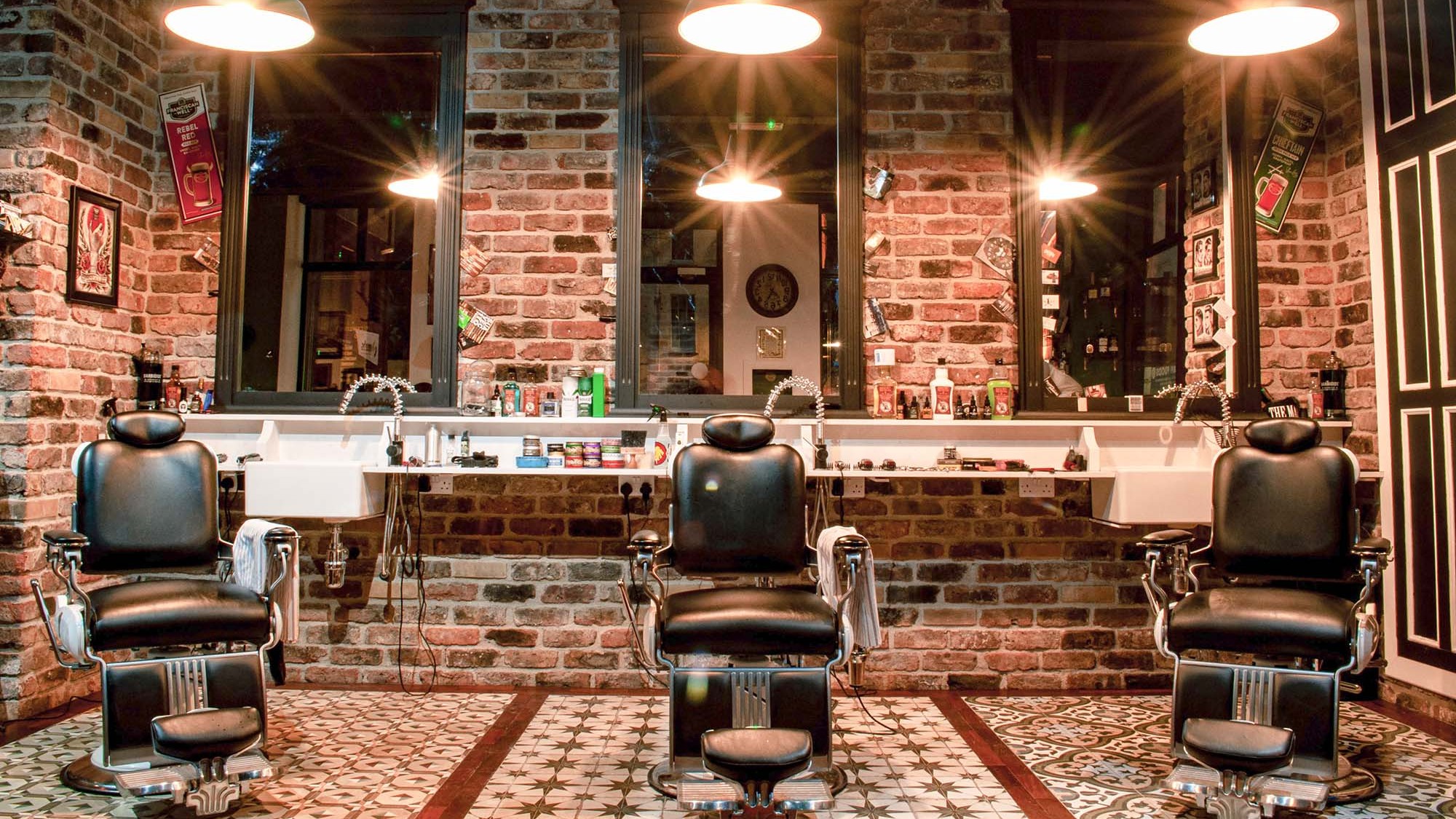The most important difference between a barber and a hairstylist is that barbers are exclusively certified to perform shaving services with a straight razor: if you want a shave, you'll need to go see a barber. Beyond that, many states have different license laws that determine what each career path is able to perform.
Kay Mata, a salon expert from My Salon Desk, says that hairstylists who are licensed cosmetologists can provide a wide spectrum of services: "They are fully licensed to perform a variety of beauty and personal care services, including shampooing, hairstyling, haircutting and barbering, chemical services (perms, relaxers, coloring, etc.) as well as a suite of esthetics services: makeup application, eyelash extensions, facials, light chemical peels, nail artistry, and certain types of hair removal (waxing, sugaring, etc.)." Not all hairstylists who are cosmetologists choose to provide those esthetic services, but they do learn how to do them in cosmetology school, and must display their ability to do them in a practical exam before being licensed.
Like hairstylists, barbers are qualified to provide shampooing, hairstyling, haircutting and barbering services. Depending on the laws in the state where they work, some barbers are able to provide chemical services (perms, relaxers, coloring, etc.), though they typically are not able to provide the full range of esthetic services that cosmetologists can. Per Mata: "While they are qualified to remove unwanted hair or apply certain cosmetic preparations to regions of the face, they typically aren't permitted to perform most esthetics services including lash extensions, nail design, or body hair removal. Due to the limited range of permitted services, barbering licenses usually require fewer training hours than cosmetology licenses."
Barbers and hairstylists also work in different locations. Consquilla Carey, stylist, hair educator, and owner of CC Beauty institute shares: "Some hair stylists strictly work in a hair salon. Some may style hair on location such as movie sets, tv sets, weddings and special events. Barbers often work in a barbershop, and it is usually a predominantly male environment."
What are the differences in qualifications/schooling?
Barbers and Cosmetologists alike are both regulated by State Boards of Cosmetology and Barbering. Both programs require anywhere from 280 to 1750 total training hours, divided between practical hands-on training and classroom based education.
Khamis Maiouf is a professional barber who has run a successful barbershop for the past 20 years. He explains: "All states require a high school diploma or GED, but some states also require barbers and hairstylists to have an associate's degree or postsecondary training. On average, barber and cosmetology schools last 10 to 12 months and are available through private vocational schools or technical colleges. Hairstylists who want to receive a cosmetology license may need to take classes in topics such as hair coloring, hair straightening, and hair care. Barbers are taught to create a specific list of short haircuts and shaving services, while hairstylists need specific knowledge and skills for long hairstyles, including chemical processes for proper hair care and restoration. The licensing exam will test their practical skills in these areas and their knowledge of professional practices in general."
In addition to their initial schooling, both hairstylists and barbers can pursue additional training through continuing education courses. They can also pursue Master-level and Educator licenses, and begin training other stylists and barbers.
What work is better done by a stylist, and what is better done by a barber?
Patrick Kenger is a Men's Image Consultant who has worked extensively with both barbers and hair stylists. He shares, "In general, if you're after a shorter cut and you want tighter lines and fades with the use of clippers, a barber would be a better fit. If you're looking for old school classic hairstyles such as side parts, drop fades, etc, barber for sure. Barbers are a lot more electric clipper oriented - though some barbers are skilled in scissor cutting, most just use clippers and are more skilled in fading techniques."
He continues: "If I have a client with medium to long hair and they're looking to get a haircut, typically I would recommend a stylist. Stylists are more versatile, and whilst they might not have the pure fading skills of a barber, they can scissor cut, layer, texturize and work with a lot more variety of hair lengths. If you have longer hair and you're looking for a fuller/longer style trimmed with scissors, a hair stylist would be a better bet."
Mata agrees: "There is great crossover between the styling abilities of both cosmetologists (hairstylists) and barbers, but generally barbers specialize in short styles that require the use of electric or straight razors. Cosmetologists may also specialize in short hairstyling, but would not be permitted to provide a close straight razor facial shave."
"Cosmetologists are preferable for advanced hairstyling techniques associated with longer hairstyles, such as complex color highlighting, hair extensions, and bridal up-dos. Moreover, a cosmetologist would be the ideal option for clients seeking a full suite of esthetic beauty enhancements."
Multiple experts who we spoke to noted that while some barbers are able to provide chemical treatments such as color services to clients, many do not. So if you're looking to change the color of your hair, you'll likely want to head to a salon.
Dually licensed barber and cosmetologist Madison Dufour says that while all of the above is typically true, you should always make room for individual differences in skill, regardless of the provider's status as barber or stylist. "The work better done by one or another professional has to do with the skill and determination of the professional. Some hairstylists can fade better than some barbers. And some barbers have more knowledge, practice, and talent in color than some hairstylists and cosmetologists. Sure, generally speaking, barbers have more practice and skill in men's hair and beard care, and hairstylists in women's and kids' cuts. But it truly depends on the background, practice, experience, and skills of the individual professional themselves."
What's the difference in prices?
Overall, hairstylists provide services that are more expensive than those provided by barbers.
Carey explains: "Shorter hairstyles provided by barbers are usually cheaper to do and easier to maintain. Hairstylists apply a more complex approach that includes the use of a larger number of hair products and tools, so their services are usually more expensive. Some barbers may charge $15 to $50 per client. The average stylist can charge $45 to $700 per client depending on what services"
Kenger, meanwhile, estimates that stylists are typically at least "20-30% more expensive" than barbers. "The complexity and customization of services in cosmetology and esthetics makes them generally more expensive (and lucrative) than barbering services."
Still, all of that is not set in stone. Dufour shares: "The difference in prices for customers in the shop does not always depend on the license of the professional, but on the shop itself. Salons and shops that are privately and corporately owned vary in prices based on their location and variety of services, as well as their view of the quality of the work done there. For example, a high end salon in New York or California may charge $200 for a women's haircut, but another chain salon in Wyoming might only charge $25."
Wanna learn more about the world of skin and hair care? Here's your next read:
Frizzy Curly Hair Care 101
How to defrizz your curls and get 'em back into shape!
Hot Rollers Vs. Curling Irons
What's the difference between hot rollers and curling irons?
Difference Between a Mole and a Freckle
What's the difference between a mole and a freckle?
Moisturizer vs Lotion: What's the difference?
Can you use body lotion on your face?
Tips For Washing Hair In Hard Water
This is your guide to washing your hair in hard water
Minimalist Hair
Welcome to the wonderful world of minimalist hair
Type of Combs: Materials and Shapes
Your complete guide to picking out a comb


